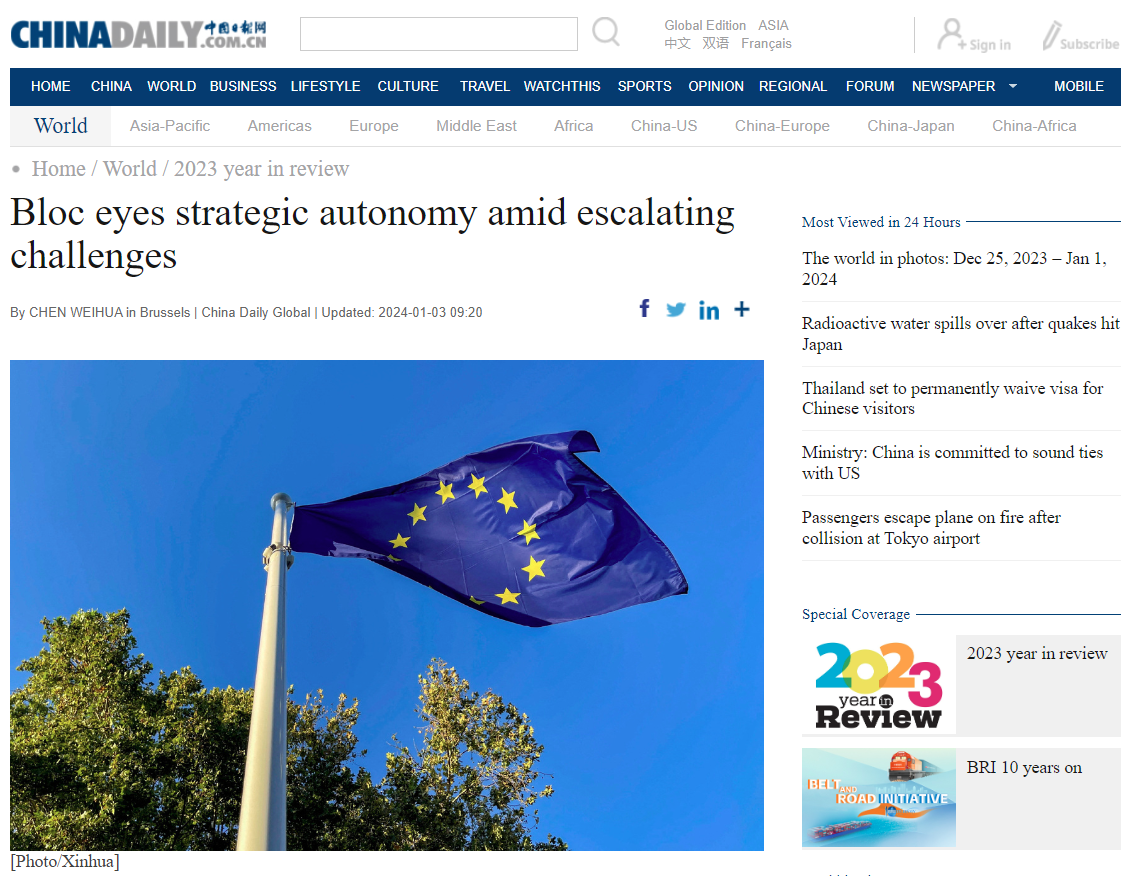LATEST INSIGHTS
Your Present Location: LATEST INSIGHTSWang Yiwei: Bloc eyes strategic autonomy amid escalating challenges
Source: CD Published: 2024-01-03

The European Union has continued its search for strategic autonomy amid greater challenges on both geopolitical and economic fronts.
French President Emmanuel Macron has been a passionate advocate when he pushed the EU's strategic autonomy in his speech at the Sorbonne University in Paris in 2017, a concept that first appeared in the EU defense document in 2013 and was then incorporated into the 2016 European Union Global Strategy document.
Macron caused a stir in early April when he said Europe must reduce its dependence on the United States and avoid getting dragged into a confrontation between China and the US over Taiwan.
While Macron's remark triggered backlash on both sides of the Atlantic, European Council President Charles Michel came to his defense by saying that European leaders are becoming increasingly favorable toward Macron's push for strategic autonomy away from the US.
Open strategic autonomy was the main topic of the informal meeting of EU heads of state and government in Granada, Spain, in October, during the six-month Spanish Presidency of the Council of the EU, which ended on Sunday.
The goal was to move toward a more competitive and resilient EU in the face of geopolitical and technological challenges in the world, especially when the EU was viewed as increasingly lagging behind the US and China.
The bloc believes the COVID-19 pandemic and the Russia-Ukraine conflict have taught a lesson that overdependence could pose a threat to its economy and the well-being of the 440 million EU citizens.
'Its aim is to find a new balance between security and competitiveness that will ensure the EU's future ability to act autonomously when and where required and to work with partners wherever possible,' the Spanish presidency document said.
The document proposed nine lines of action to 'tackle the vulnerabilities identified in a systemic and realistic way', including boosting internal production capacity, monitoring and limiting foreign ownership of some sectors and creating a contingency plan for future shortages.
While the document highlighted the need to rebalance economic relations with China, it stressed that China is an essential trading partner for the EU and the fact that decoupling from its economy is neither a viable nor a desirable option, a message that EU leaders also delivered at the 24th China-EU Summit in Beijing in early December.
The EU has made some progress on strategic autonomy when the European Parliament and the 27 members reached a provisional deal in April on the European Chips Act that aims to boost its competitiveness in semiconductor industry against the US and Asia rivals. The goal was to double the EU's global market share in semiconductors from 10 percent to 20 percent by 2030.
In November, the European Parliament and EU member states reached a deal on Critical Raw Materials Act proposed by the European Commission in March, an act that also aims to compete with the US and China in making clean tech products.
The proposal said the EU should extract 10 percent, recycle 15 percent and process 40 percent of its annual needs by 2030 for 16'strategic raw materials'.
Wang Yiwei, director of the Institute of International Affairs at Renmin University of China, said the EU's pursuit of strategic autonomy reflects its increasing distrust of the current world amid a reversal of globalization, and in a world that is dominated by the US and China such as in artificial intelligence.
While the bloc's strategic autonomy targets both China and the US, Wang said he believes it will be impossible for the EU to get rid of the US when it comes to its dependence on defense, AI and internet search engines.
He questioned the EU's ability to achieve its goal, saying the bloc is 'a giant of ideas but dwarf of action', adding that the Franco-German axis no longer exists.
Eva Michaels, a research fellow at the Barcelona Institute for International Studies, said the EU needs to avoid overrelying on others for both the anticipation of and response to international security crises.
'Europe cannot afford to be a bystander when confronted with security threats and challenges in its neighborhood, especially when Washington's long-term priorities lie elsewhere and when (the 2024) US presidential election risks undermining NATO,' she wrote on the Engage EU blog.
Key Words: Wang Yiwei, EU, Open Strategic Autonomy























































































 京公网安备 11010802037854号
京公网安备 11010802037854号





